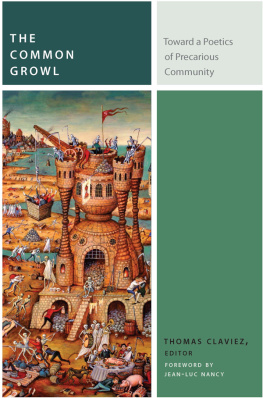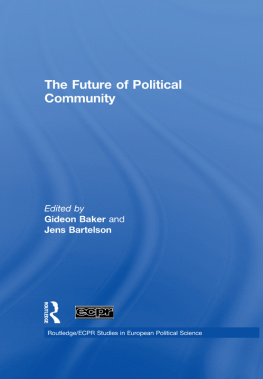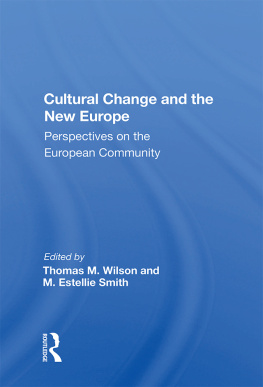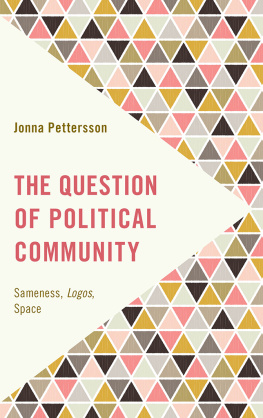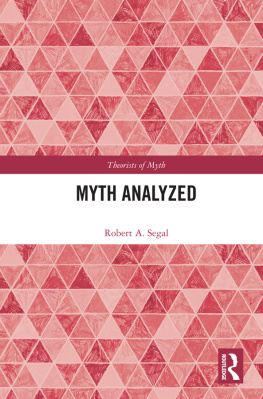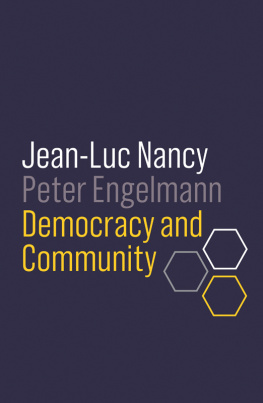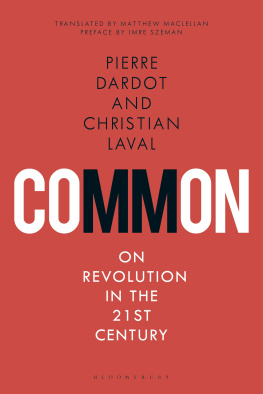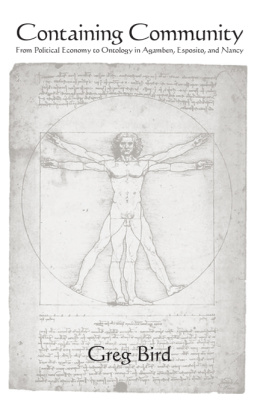Copyright 2016 Fordham University Press
All rights reserved. No part of this publication may be reproduced, stored in a retrieval system, or transmitted in any form or by any meanselectronic, mechanical, photocopy, recording, or any otherexcept for brief quotations in printed reviews, without the prior permission of the publisher.
Fordham University Press has no responsibility for the persistence or accuracy of URLs for external or third-party Internet websites referred to in this publication and does not guarantee that any content on such websites is, or will remain, accurate or appropriate.
Fordham University Press also publishes its books in a variety of electronic formats. Some content that appears in print may not be available in electronic books.
Visit us online at www.fordhampress.com.
Library of Congress Cataloging-in-Publication Data available online at catalog.loc.gov.
Printed in the United States of America
18 17 16 5 4 3 2 1
First edition
JEAN-LUC NANCY
Of politics, today, nothing remains.
Of politics, today, everything remains.
Nothing remains because what defined the content of the word politics has been swept away by a history that there can be no question of reviving or probably even of revisiting.
First, this was the history that saw the birth of the polis , that is to say, the form that a gathered collectivity gave itself, one governed by itself and not by a divine authority. The Greek city, like the Roman one, depended on a shattering of theocratic or tribal forms of organization (which were often interlinked), but not without retaining essential aspects of the rigid hierarchies that structured traditional societies, as well as the displacement of a part of social sacredness onto what we can (anachronistically) call civil religion.
The general design of the ancient city no longer makes any sense to us since it unraveled of itself. The polis was formed, transformed, and deformed with the movement of a civilization profoundly in flux, leaving behind the reproduction of life based solely on agriculture to initiate forms of production and commerce Marx called pre-capitalist. The representation of another city ended up being invented, that of a God resolutely outside the world and before whom the hierarchies and forms of domination that structured society no longer obtained.
The task of making the worldin the sense of a space for circulation of senseto which the city was supposed to respond, became divided in two: on the one hand, the transfiguration of the world into Gods kingdom; on the other, the configuration of the world of humans. Politics thus became the name of a space to be invented: It will be called Republic (in all the successive values of the word, at least since Jean Bodin), a space for the creation of sense (of the world), whose consistency and stability (the State ) are assured through sovereignty (the quality of origin and of founding public law). When sovereignty ceased to be identified with a figure (a royal one, for example) and became that of the people, it adopted the task of configuring the space of this people. This is what goes by the name of democracy.
At this point, politics suffered a profound dehiscence. On the one hand, it remained identified with the Republic and with the State, at the same time that its scope of practice and legitimacy came to be determined as the nationan assumed or fashioned identity. On the other hand, preserving the traits of a figural, authoritarian, and separate organizational function ( instance ), it was destined to cancel its own separation and to disappear as a distinct sphere in order to re-emerge immersed in all spheres of common existence, beginning with the exercise of decision (council, direct democracy).
The separation of politics has neither been abolished nor really maintained. What has effectively occurred is an impregnation of all spheres of common existence (that is to say, tendentially, of existence tout court , the common of existing, both human and non-human, that with which the word communism was supposed to be charged) by infrapolitical as well as suprapolitical schemata. These involve mythical and affective representations of collective destinies (which at the same time shelter enormous techno-economic machines) or else the representation of the generalized management of comfort within the general equivalence of market valuein one way or another, a world of completeness or of indefinite saturation.
This is the point at which nothing remains of politics, and thereby everything of it remains: The question of the configuration of a space for circulation of sense (one can also say: of sense, thus of circulation without completeness) is fully posed, open, gaping.
In this opening, at least one signal flickers: All forms of completeness or of saturation, ideological or techno-economic, engender inequalitiesinhumanities, insensibilities, insanitiesthat are not only as onerous as those sustained by former hierarchies and forms of sacredness, but that are also henceforth clearly devoid of any appearance of natural or supernatural justification.
That is why politics subsists at least as revoltwhen necessary, as a revolt against politics. Revolt does not mean revolution to the extent that this latter term has come to bear the projection either of an overturning of the basis of politicswith the conservation of its structureor of a complete abolition of the separation of its organizational function. Neither does revolt promise as much by way of great risks, which is why it may become suspicious even of revolutionary politics. But it protests that existence is untenable if it does not open up spaces of sense; that this opening up of sense is impossible so long as what reigns instead of circulation is the pitiless circularity in which everything-amounts-to-the-same; and that this reign itself is devoid of any kind of glory or grace, whereas the other reign, that of the heavens, no longer flutters except exsanguinate and grimacing.
Subsisting as revolt, politics perhaps no longer subsists at all; but perhaps it is not necessary to think in terms of subsistence, of remainder, or of survival. It is above all necessary not to wait for anything from politics, as if it were the mysterious reservoir of who knows what hidden resource of meaning.
Revolt still denounces the spirit of a world without spirit, even if it does not intend these words entirely in the same way. Without spirit: not without spirituality but without the brio ( vif ) of signs and acts by which, alone, one exists .
Revolt, however, does not make clear what the lan ( vif ) of an existence open to its possibilities might be. Revolt does not discourse, it growls ( gronde ) . What does growl mean? Its almost an onomatopoeia. It means to grunt, bellow, and roar. It means to yell together, to murmur, mumble, grouse, become indignant, protest, become enraged together. One tends to grumble alone, but people growl in common. The common growl is a subterranean torrent: It passes underneath, making everything tremble.
Translated by Steven Corcoran

